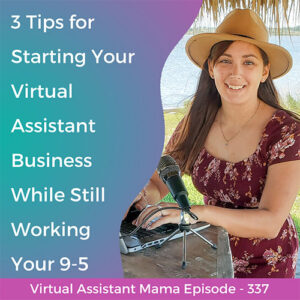
Episode 337: 3 Tips for Starting Your Virtual Assistant Business While Still Working Your 9-5
In this episode of the Virtual Assistant Mama podcast, I’m sharing 3 tips to help you start your Virtual Assistant business while still working your 9-5.
On today’s episode of the Virtual Assistant Mama podcast, I interviewed Mary Adkins, author and writing coach. Throughout this episode, Mary shares 3 teacher skill sets that will help you write your first book, as well as strategies you can use to help you bring it to life!
Connect with Mary on her website https://maryadkinswriter.com/, on Instagram @ adkinsmary, and in her Book Incubator program http://thebookincubator.com/
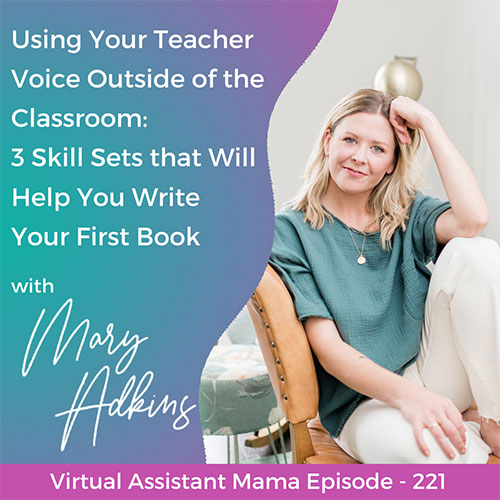
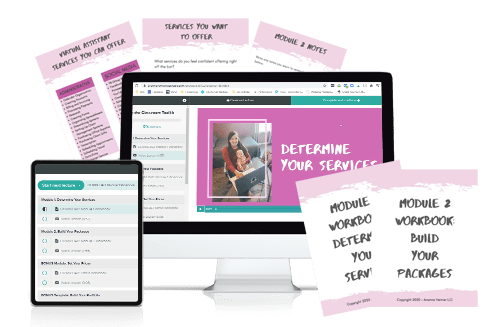
Grab your Ditch the Classroom Toolkit for only $47!
Sign up for the free Virtual Assistant Workshop, the Ditch the Classroom Toolkit, or Teacher Turned Freelancer Academy.
Have any questions for me? Feel free to send me an email at arianna@ariannavernier.com or on Instagram @arianna.vernier! I love chatting with y’all and helping you hit the ground running. Are you ready? Let’s go.
Love,
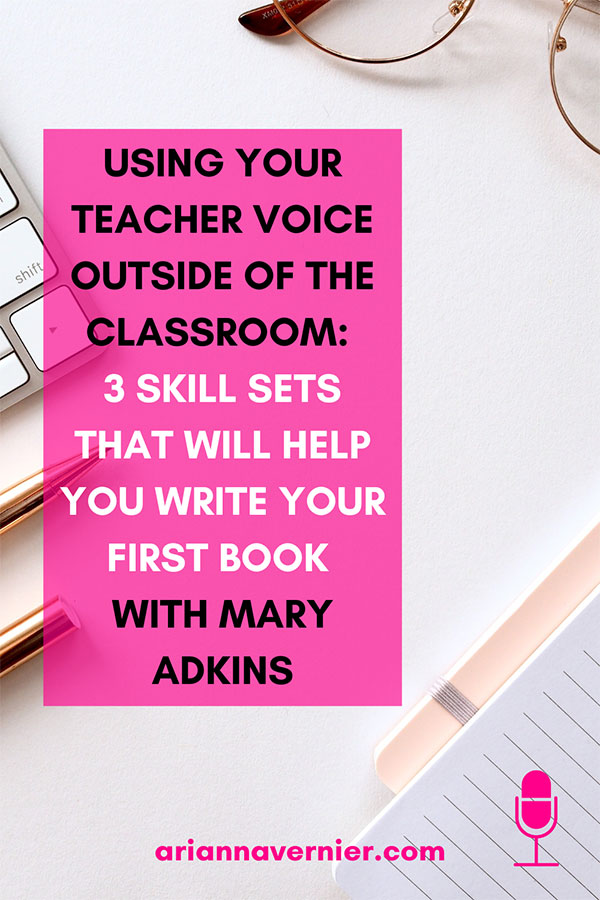
Full Episode Transcription:
[00:00:00] Arianna Vernier: Y’all. I have a special episode here for you guys on the Ditch the Classroom podcast. Today I had the pleasure of interviewing Mary Atkins, an author turned writing coach, and she shares some amazing nuggets of different skills that teachers have that they can use to become an author and how to make that transition to full-time writing.
[00:00:26] Or just do it as a side hustle. She shares tips for that as well. So I know y’all are going to love this episode. We’re just gonna go ahead and dive on in.
[00:00:37] Hey Mary, welcome to this show. Thank you so much for coming.
[00:00:40] Mary Adkins: So happy to be here. Thanks for having me.
[00:00:42] Arianna Vernier: Yeah. I would love if you would just kind of start us out before we jump into all of our questions about how teachers can use their skills to become authors. I would just love if you could kind of share with us a little bit about you, maybe a little bit about you personally, and then how you’ve gotten to where you are today.
[00:01:01] Mary Adkins: Yeah, I’d love to. I live in Nashville currently, but we’re actually moving to Dallas soon, so I’ll be a Texan soon. I lived here with my husband and my five-year-old son, Finn. I was a lawyer before I was an author. I was not a lawyer for very long, less than a year actually. So like this is on my second day of being a lawyer. I started trying to figure out how not to be a lawyer, so that was like a very short tenure. Shortly thereafter, I left law and actually started teaching. I was teaching for a, like a test preparation, a small test preparation company in New York that has since been acquired by Kaplan, which a lot of people are familiar with Kaplan. But that was how I paid my bills. But my goal was to write, like I wanted to, I wanted to be a writer, a novelist. Eventually, once I got the confidence to believe that maybe I could actually try fiction, and it took me about six years, but I did eventually find a publisher for my first novel and then for my next two novels. So I’ve published three novels now, and I have a memoir about pregnancy loss that’s gonna be coming out in a couple of months, and I now work with aspiring authors, so people who are working on their, their, a lot of times their first novel, but not always. Sometimes they’ve written one before and it’s their second or third. But most of the writers I work with are working on a first novel or memoir and a few people who are even working on, on nonfiction kind of self-help books. And I love it. I love working with writers and I really love working with aspiring authors who are educators, people who are either currently educators or used to be. So I’m really happy to talk to you today.
[00:02:44] Arianna Vernier: Yeah, you’re in a good spot. We got all of those here. I love, we have a similar story. You know, I only taught for three years and very quickly realized that was not what I wanted to do. So I love how you mentioned that you only did that for a year and then you were like, okay. Backtrack, we gotta figure out something else. I think a lot of people start feeling that and, but they’re scared of change and so they just kind of stay in that stuckness. But we only get one life to live. So Yeah. I love how you just, you know, took that step to really change and pivot into what you really wanted to do.
[00:03:22] Yeah, and I don’t know about you, but like in my
[00:03:24] Mary Adkins: case, the pivot that was really necessary was like, was finding a way that I could have time to, to do my passion, which was writing. So like being a lawyer did not give me that time and I knew it just wasn’t going to, everyone I talked to was like, you, you’re not gonna be able to be a lawyer. And then probably, unless you’re, you know, you might burn out. Then go home and, and write. So I just had to shift things around so that I had time to write, and that was the first big step I had to take. That was definitely the scariest step, I think. But once I did that, once I had time for my passion, which was writing, everything was easier from there because, I don’t know. I don’t know why. I think it was just like I had taken that big scary step into the unknown and then, I felt good about that. You know, like it was confidence building.
[00:04:13] Arianna Vernier: Yeah. Every other little thing. Or not even just little things, but if you know you’ve done something big and scary once, it makes the next big and scary a little bit easier.
[00:04:22] Mary Adkins: Exactly. Because you’re like, look, I survived. I’m okay. I’m still here. Yeah. So, yeah. Maybe I can do that again.
[00:04:29] Yeah. I love
[00:04:30] Arianna Vernier: that. So let’s jump into the questions I have for you, because I know the listeners really wanna know how they can jump into this author world, especially if they’ve never. Been one before. So what would you say are the top three skills that teachers have that can translate into writing a book, and how will those skills help educators unleash their creative side to create that book.
[00:04:59] Mary Adkins: Okay. I love this question and in preparation for it, I talked to a couple of the teachers who I were teachers or former teachers who I work with to ask them what they thought because I really have been surprised how many teachers have ended up wanting to write novels and like being in my program. I mean, it’s very cool. I kind of expected the lawyers because I am a lawyer and I know a lot of lawyers wanna write. But I’ve been pleasantly surprised by the teachers. And it makes sense to me though, now that I think about it because, okay, so the, the three skills that I, that came to mind in conversation with, teachers I work with who are now novelists, one is planning. My writer who works with me, Gail, she mentioned this and she was a teacher for a really long time. She said that, and I think that this was really interesting. She’s like, you know, as a, a teacher, as an educator, like you have to be able to look at the big picture of what has to be conveyed, what has to be achieved, and then break it down into smaller pieces. And that is such an essential skill for writing a book because a book is like, a huge undertaking, right? Like it’s a, it’s a, the kind I teach is narrative. So it’s either gonna be fiction or nonfiction, an novel or memoir, but it’s like that’s 70,000 words a lot of times or more. And so that can be very daunting to someone who doesn’t have the skillset set of being able to break down that really big mammoth project into manageable pieces. And I find that teachers often have that skill and kind of, you know, we take it for granted. It should not be taken for granted cuz not everyone has that skill, right? To be able to like look at a big undertaking and go, okay, how do I actually tackle this piece by piece? So that’s a huge one I think.
[00:06:43] Arianna Vernier: Yeah, I agree. And in the teaching world, we call that backwards design, like knowing, just for example, if you have to give your kids a test, you have to know like what they need to know to be able to pass the test. You have to figure out how to break that down and get them to that point of successfully mastering it yet.
[00:07:00] Mary Adkins: So that is really cool. Okay. Another one that may seem obvious is, Better readers make better writers. Like that’s just true. And not everybody who wants to be a writer is someone who is read very much, or someone who likes to read. Not that all teachers are voracious readers, but I find that teachers tend to be good readers, which makes sense because you have to read a lot in the profession. Right. And a lot of times, like even if you’re not teaching, English or language arts or reading and writing, like reading is gonna be a big part of the work. And so I just think that’s, again, one that’s can be kind of taken for granted, but shouldn’t be because it really does make a difference. Like the teachers I work with tend to come in having read the kind of book they wanna write and they, they know, they can kind of point to like, okay, this is the kind of book that I wanna write. I really like this author. And they have this intuitive sense of. What they’re up against. Which is super valuable, you know, because like before you can do a thing, you have to know what you’re trying to do. And like, getting your head around that is just such a good starting place. So yeah. But like those reading comprehension skills that teachers have are just incredibly valuable when you come into this. Kind of work. And I don’t actually believe that people have to have written a creative word in years and years. I mean, I work with writers. I work with a writer who just finished her novel. It’s a middle grade novel, so it’s for, like eight to 12 year olds. And she is a doctor, like she would joke that she hadn’t written a creative word since. In like 20 years. But it doesn’t matter. That creative spark, I really believe is in all of us. And just because it’s latent, it doesn’t mean you can’t write an amazing book. Sometimes people say, oh, do I need to like start small? Do I need to write short stories first before I try a novel? No, I didn’t. I’ve never written a short story. I like, I went from zero from being a lawyer to writing novels like overnight. I just think it’s important for people to realize that like you don’t have to do a slow gear up.
[00:09:09] So like, let’s say you’re a teacher and you, you know, there are certain books that you love that you know your students love. Not that you need to write young adult or middle grade. You can also be writing for adults. But like, let’s say there’s something that you, you love and you wanna write that. I don’t want that person to think, oh, but I haven’t written creatively in a really long time. I’m gonna have to take all these classes first. I’m gonna have to start with a short story. Like, no, it’s just not true. Like you really could, people could like sit down and write a really strong novel draft coming from not having written creatively in a very long time.
[00:09:48] Arianna Vernier: I think a lot of that stems from, some people just have that perfectionist tendency and so they think they have to write the best, right out the gate and have everything in place. But I say this a lot here on the Ditch the Classroom podcast. We’re all about done, not perfect. You can always tweak things down the line, and that’s a big part of what writing is, right? You write a first draft and then you tweak it, and then you probably gotta do another draft and you keep going. But even just getting that first possibly hairy-scary draft out of you, that’s such a big step to take.
[00:10:22] Mary Adkins: Yeah. It’s really the biggest step and like the hardest one and aim into that. Like, done over perfect. You don’t have to let go of your perfectionism. You’re not lowering your standards, you’re just pushing them until. Like you don’t need to refine it yet. It’s the first draft. Like you, you get to be picky. It’s just, that comes later on, you know? And like you, you gotta get it down first. It, it has to happen in stages. Yeah.
[00:10:46] Arianna Vernier: I like that. Push it till later.
[00:10:49] Mary Adkins: Exactly. So then the third skill that I think teachers have that, is just so valuable for storytelling. How to engage people, like how to be interesting, how to get their attention and how to, how to speak to them in a way that’s clear. And communicate something. Again, those are huge skills. Those are not things that everyone can do, but it makes sense to me that teachers can do that because if you’re a teacher, like people you’re teaching, their attention is not granted to you, right? Like you gotta earn it, you gotta hook it. And that is exactly like writing for a reader. Like the reader is not here to give you the benefit of the doubt the reader wants you. To immediately engage them, tell them why they need to be reading, make it easy for them to follow. It should make sense to them. It should be clear. And those are things that a lot of people who are not teachers do struggle with. If they’re not in professions where communication is so important, but in teaching, communication is so essential, right? That is just incredibly valuable when it comes to telling a story. If you’re not engaging someone from the first page, they’re not gonna read the second page. Teachers already have a lot going for them when it comes to writing a novel. They do. And I think it’s so ingrained in us, like, we went to school for teaching. We have to use this degree for teaching, but. We can use those skills in so many other different places, and you just have to kind of open up your mind to the possibilities of it, and that’s where that can take a little bit of work to get used to that. I think it can be really cool to think about how you can still educate through other forms, right? You can convey a message, you can teach through fiction. Fiction. I don’t know, that’s just a, I think that could be a really cool challenge for someone to think through how they could translate that passion and just to a, into a different form.
[00:12:43] Arianna Vernier: Yeah, I agree. So what advice do you have for those teachers who want to transition from full-time teaching over to full-time writer or author?
[00:12:57] Mary Adkins: I think you just said one a second ago, which is basically trusting that if you can get a draft done, even if it’s not perfect, you are in a very good position because then you have something to work with. So that’s one that’s like a mindset issue, but then practically speaking, I think it’s so important to find time you can carve out to do it. It doesn’t have to be hours and hours a week. A lot of times people think they don’t have times they’re like, to write a novel, you must have to work on it like two hours a day. You don’t, you definitely don’t. In fact, especially once you lower those perfectionism standards for the first draft, often you can churn out a draft in. Like three total hours a week. So divide that up. However it works for you, like 30 minutes a day, or 45 minutes, four days a week, or however you wanna do it. Find those pockets, and if you’re writing a total of three days a week and you’re not being perfectionistic about it, people can usually get a draft out in about four months, which is pretty fast, right? I mean it like four months from now is just like, it’s another season, but otherwise things are probably gonna be mostly the same, but you could literally have a draft of your novel. It’s in both another mindset shift, but also just a very practical thing, like look at your calendar and think, okay, where can I find three hours in a week to work on this thing and then just commit to doing it. You know, just track your progress and commit to doing it. So for people who are having difficulty typing because it, you know, they don’t even have to know the reason. They just know that they sit down and staring at a blank screen is daunting. Experiment with handwriting because handwriting can be really liberating if you do hand write. I have a method called the Four Notebooks Method because basically if you fill four notebooks that are about a hundred pages each, that’s a solid draft of an adult novel, lengthwise. So you can that, that way you can get your head around. Okay, well if I’m handwriting, how much do I need to write? Well, you need to write on about a hundred pages of four notebooks, and that should be a really solid length for your first draft.
[00:15:10] Arianna Vernier: I think that is so helpful and I think one tip that helped me, if y’all listening, don’t know. I wrote a book that released this past February. It’s called Teacher Turned … Uncover Your God-Given Purpose Outside of Teaching. And when I sat down to write that, I’ve never written a book before, but something I teach here on the podcast is time blocking. Figure out when you got your different responsibilities throughout the week and put them down on paper because like you said, writing a novel, there’s something about that writing on paper. Putting your plans out on paper is so helpful. Like you don’t get the same effect like in a digital planner. What helped me is I was able to really clearly see the white space I had in the week where I could potentially write. I am not necessarily one where I like to set a designated time where like, this is what I’m gonna write cuz then if I’m not in the mood, I’m just like, this is not gonna be good. So just seeing that white space of the possibilities helped me. And then I set a goal for myself to try to get one chapter a week done and that felt really good to me. And it didn’t seem as overwhelming, like, oh, I still have 10 chapters I have to write. No, I’m just focusing on getting this one done this week, and I have this amount of time I could do it. And if I don’t feel like it one day, that’s okay. I still have this other time, these days to do it.
[00:16:31] Mary Adkins: Yes. I really like that. Yeah, I think that’s great. I love the time blocking.
[00:16:37] Arianna Vernier: I know a lot of my listeners are people who are still wanting to be in the classroom, but maybe they just need like a side hustle to supplement their income. And like you said, maybe they’ve always dreamed of being an author, but never really knew how they could do that along with teaching. How do you recommend they kind of find that balance between writing a book and then their time teaching and all their mom duties and all of that? What strategies can they use to stay motivated and productive for finishing their books?
[00:17:10] Mary Adkins: This strategy that I’m sharing is really useful if you are writing a long form narrative. Cuz again, this is what I’m, this is the main thing I teach is like writing a novel or a memoir, meaning like you’re telling a story over the course of the book, right? So if you’re planning out a full story, you don’t, I don’t teach that. You need to know how it’s gonna end. In fact, I never know how my books are gonna end. But like, if you have a sort of general idea of the story you wanna tell, you can think of the story no matter how it ends. As being made up of scenes like scenes are the DNA of a story, a sort of average length of a scene would be about 1200 words. That’s about the average length of my scenes. That seems to be true for writers. I work with about 1200 words. So good Target link for a novel draft, like an adult novel draft is 70,000 words. That’s gonna be like 50 to 60 scenes total for your book. And that’s also true for a memoir if people are writing for a younger audience. So if they’re writing for young adults and teenagers, it’s still the same length, 70,000 is a good target. If they’re writing middle grade, like for, you know, the eight to 12 kind of range, that would be more like 40 to 50,000 words. So it’s, it’s definitely shorter naturally. So you can still break that down, right? So like for a middle grade it would be 40 or so scenes as opposed to 60 scenes. Anyway. So if you think about a story as being made up of these scenes, one way that can be seem very manageable when it comes to like balancing life and work and creativity is deciding you’re going to write one scene every day or three scenes a week, or you know, whatever feels manageable. I love this strategy because. It means I will sit down to write a scene and if it takes me 10 minutes, I’m done for the day. Like I don’t have to feel like, oh, I should have sat down for 45 minutes. You know, like, but if it takes me an hour, well it takes me an hour. I mean, I just have to find that where I have it in the day. But it feels really flexible. Mm-hmm. And it’s comforting because I know, okay, I have about 60 of these to write six zero. So. In 60 days, if I do it every single day, I’m gonna be done. And that’s like a very cool feeling to be done with your draft in 60 days. Now you’re gonna skip some days, right? Like no one’s gonna write the same write literally every single day probably. But that’s fine because you’re still making progress even if you write a few days a week. And it will still a lot of times, like I said, get done faster than you think in a few months. So I really like the method for balance.
[00:20:02] Arianna Vernier: Yeah, I think that’s really good. It’s kind of for my book, the chapters were pretty short, but if you are writing, like you said, a 70,000 word book, your chapters might be pretty long. So I like that idea of just breaking it down into the scenes and yeah, there might be a couple scenes in a chapter. You don’t have to sit down and write out that whole chunk, but just breaking it down even smaller makes it so much easier. I always say, how do you eat an elephant? You’re not gonna put the whole thing in your mouth at once. You gotta eat it a bite at time. And so that can be applied to so many things, but especially book writing.
[00:20:40] Mary Adkins: Yeah, exactly. Like manageable pieces. I think it’s a really good point. I think with, with a novel, a lot of times you don’t know what the chapters are gonna be yet. Like you, those come later when you’re revising, you decide what those are. So scenes, like you said, it’s just a lot more manageable of a unit to use.
[00:20:57] So let’s transition now. I
[00:20:59] Arianna Vernier: wanna ask you, are there any common misconceptions or challenges that teachers face when it comes to writing their book, and then how can they overcome those?
[00:21:13] Mary Adkins: I mean, the one that I see most is honestly also true for not all other professions, but definitely for some like lawyers, which is that a lot of times teachers are pretty burnt out. So it’s hard to think of adding one more thing. And I have a lot of sympathy for that. Like, I don’t know, I feel like we live in a culture where we’re all burnt out all the time, and so like the idea of being like, I’m just gonna add, writing a book onto my pile of things I have to do every day can sound tiring. Like even just thinking about it. And again, like I have a lot of sympathy for that. The only thing I will say about that is like, There are some things, right, that when you add them to your load, they don’t seem to make things heavier. They seem to make things lighter. Like yoga is like that. For me, when I work that into my schedule, it actually seems to open up my schedule because it’s, I mean, I don’t know, I don’t love the term self-care cuz it’s used so much, but like, cuz it’s self-care and I find that like people who have a book burning in them that they wanna write, Even if their goal for writing it is professional, like they want to publish it, they want, maybe they want a career as an author, maybe they just wanna write a book and publish it. Like it could be anything. But even if they have aspirations like that, I think it can still, in a way, be a form of self-care because it is this thing burning in them. They have, we like, we have this creative energy that wants to get out and its actually really good. It feels good. It’s like exercising or like, Getting more rest or doing something for yourself that’s fulfilling. And so I think the question I have for myself as someone who’s feeling kind of burnt out and wondering if I wanna add this to the pile is like, does this feel like something I really wanna do for me in addition to any other reason I may have? And if so, maybe try it because it may actually not feel like it’s adding on. It might feel like it’s. Replenishing.
[00:23:22] Arianna Vernier: Yeah, I agree. And I think sometimes just with the example of exercising, like we don’t wanna do it beforehand, but then we do it and it feels so good. And so, if that’s writing for you, like if the hardest part about. About it is just sitting down and getting started. Just know that’s with a lot of different things and that’s where you can use that time blocking method, figuring out when you have the time, and then on those days, like if it doesn’t feel good, if it really truly doesn’t feel good, then don’t do it. But if it’s just like, ugh, the getting started part, like give yourself like a little goal to work towards. Like if I just do this today, if I just write for 10 minutes. That would be enough for me. And then if you hit that and you’re feeling good at that 10 minute mark, you can keep going, but if not, you can stop.
[00:24:13] Mary Adkins: Yeah. Yeah. I really love that mind trick. Yeah. Like just giving yourself, yeah. Being like, I’m just gonna commit to five or 10 minutes, and then if you feel good, you’re like, okay, now you can keep going. You know? I kind of do that with running.
[00:24:27] Arianna Vernier: Yes. That’s what I was just gonna say when I’m doing cardio. Yeah, exactly. That’s so. All right, so I would love to ask you a question that I ask every guest that comes on the show, and it’s if someone wanted to start their ditch the classroom journey, but they just felt too overwhelmed, what would you tell them?
[00:24:50] Mary Adkins: I would start with some, this is so stolen from someone named Julia Cameron. She’s an author who wrote a book called The Artist’s Way, which is really worth checking out if people are curious. It’s about uncovering your creativity and like unleashing it. It’s really cool. But I’m more specifically recommending one tool that she shares in that book called Morning Pages. And morning pages are, every morning you hand write three pages stream of consciousness. You’re not trying to write a book like this. The point of this is not for anyone to read it. This is just emptying your mind three pages, stream of consciousness in a notebook that no one will ever see. I have found this tool to be like miraculous. It just tends to help clarify, like it helps kind of fight through fear. It helps clarify. What your real vision is like. It just, it, it’s like such a cool tool and I think it, for me, I’ve done it a few times whenever I felt like stuck or overwhelmed, but known I needed some kind of life change. And it’s worked within a couple of weeks. Like it doesn’t even take that long. So love morning pages, three pages, stream of consciousness as soon as you wake up for like a couple of weeks and just see what happens. I love that because. We have so many thoughts going on in our head all the time. There’s like I just read recently, it’s like you think, I dunno, millions of thoughts a day.
[00:26:27] Arianna Vernier: That is crazy. And so just like trying to get it out on paper. The little ones then hopefully are removed. And then you just have the big ones where you can like hopefully just hone in and focus on those and that’s where you can be productive. So I love that.
[00:26:42] Mary Adkins: Yeah, it’s like magical. It’s like giving all those little thoughts somewhere to go. Yeah. That’s crazy. Now I’m calculating how many thoughts I’ve had already today. I know. Too many. My gosh. Too many.
[00:26:55] Arianna Vernier: Well, it has been such a joy having you on the podcast today, Mary. Where can my listeners come and connect with you?
[00:27:03] Mary Adkins: So they can go to my website, Mary Adkins, that’s with a D like dog, writer, maryadkinswriter.com. Or they can go to thebookincubator.com. That’s the name of my program. And there’s just a two application, two, two question application to apply to it. And if they’re accepted, I send a video training that’s on my four notebooks method of writing a novel if they wanna check that out. So couple places that. Yeah, they can find me. And I have a YouTube channel too, so just search for my name and it should come up. I teach a lot of share, a lot of writing tips on there.
[00:27:37] Arianna Vernier: Perfect. And I’ll have all of those linked in the show notes for those of y’all listening. Awesome. Well thank you so much again for coming on today and just pouring into my audience. I know that they’re gonna love this episode and just eat it up. So thank you.
[00:27:51] Mary Adkins: My pleasure. Thanks for having me. This was really fun.
[00:27:55] Arianna Vernier: All right, y’all. Thank you so much for tuning in today. Make sure and go show Mary some love. If you’re ready to get that novel out of your brain and into the real thing, go check out all of her resources and we hope to see you back here on the Ditch the Classroom Podcast really soon.

In this episode of the Virtual Assistant Mama podcast, I’m sharing 3 tips to help you start your Virtual Assistant business while still working your 9-5.
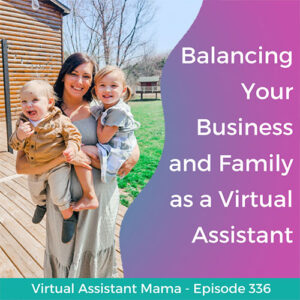
In this episode of the Virtual Assistant Mama podcast, I’m sharing how to balance your business and family life as a Virtual Assistant.
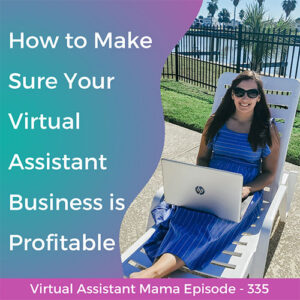
In this episode of the Virtual Assistant Mama podcast, I’m sharing how to make sure your Virtual Assistant business is profitable.